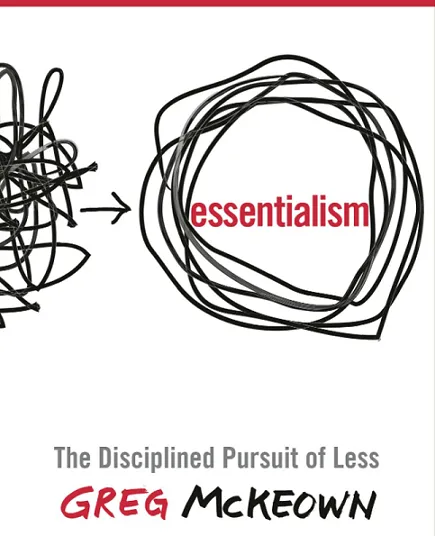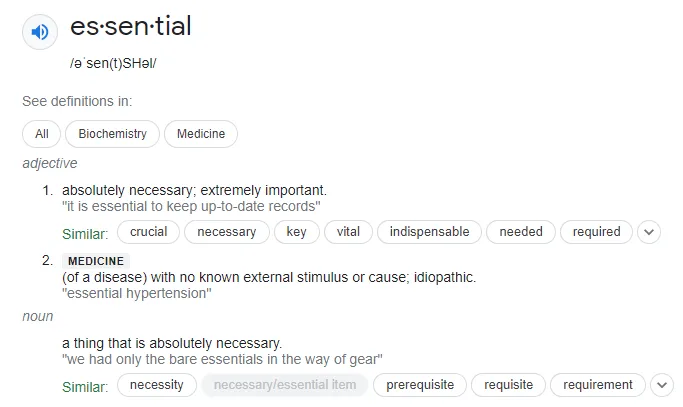
For my first post in the Hive Book Club community, I would like to share with you my key takeaways from my current favorite book, Essentialism by Greg Mckeown. This book has greatly influenced my mindset and actions on how I tackle my everyday life. Hope you like it.
To help improve your reading experience, here are some notes about how this post is outlined:
This post is divided into four sections: essence, explore, eliminate, execute. This was inspired by the division of sections in the book.
For each section, I have included my favorite quotes from the author, and my own views on the topic. Feel free to comment down below your own views on each topic. I'd love to hear about thoughts!

"The Wisdom of life consists in the elimination of non-essentials" -Lin Yutang

Essential, as defined in Google, means absolutely necessary or extremely important. This book can serve as a manual, and a well of excellent ideas, on how we can focus more on what is extremely important in our lives. This book can also serve as a good reminder (or scolding) that often times, we invest a lot of energy on trivial matters, and forget to focus only on what is essential for us.

Essence: The Core Mindset of an Essentialist
"Only once you give yourself permission to stop trying to do it all, to stop saying yes to everyone, can you make your highest contribution towards the things that really matter."
"An Essentialist makes trade-offs deliberately. She acts for herself rather than waiting to be acted upon."
"Essentialism is not about how to get more things done; it's about how to get the right things done. It doesn't mean just doing less for the sake of less either. It is about making the wisest possible investment of your time and energy in order to operate at your highest point of contribution by doing only what is essential."
We can't, nor we should try to do everything in this world. Splitting our focus in multiple, but non-essential directions usually lead to burn out. There might be a lot of times when we have felt that we are so busy, but we are not getting anything done. We have to clearly discern what are the essential things in our life, and gradually trim down on the non-essential ones. Given that we all have limited time and energy, we should deliberately choose the things that are extremely important to us, and focus our energy entirely on that. This way, we get to make our highest contribution to what is essential for us.

Explore: How can we discern the trivial many from the vital few?
"We need space to escape in order to discern the essential few from the trivial many. Unfortunately, in our time-starved era we don't get that space by default--only by design."
In a time where we are always hyperconnected, it is much more important to design a space where we can escape, and clearly reflect on what are essential and non-essential for us. In this book, the author took an inspiration from Bill Gates, where Mr. Gates takes a twice a year week off to do nothing but read articles and books, study technology, and think about the big picture. Bill Gates did this despite the busiest time in Microsoft's history.
While a lot of us do not have the resources and luxury for a week off, we can still practice this by disconnecting from social media and other online platforms occasionally. What I like to do is no screen time for the entire afternoon, once a week. This helps me clear my head, and let the things around me slow down for a bit.

Eliminate: How can we cut out the trivial many?
"The more we think about what we are giving up when we say yes to someone, the easier it is to say no. If we have no clear sense of the opportunity cost -- in other words, the value of what we are giving up -- then it is especially easy to fall into the nonessential trap of telling ourselves we can get it all done."
"An Essentialist has the courage and confidence to admit his or her mistakes and uncommit, no matter the sunk costs."
Whenever we say yes to someone, there is an instant gratification that comes from that confirmation. However, what we usually do not take into account is the opportunity cost of saying "yes" too easily on a lot of commitments.
In a corporate setup, constantly saying yes to ad hoc jobs requested by our co-workers would mean that we are saying no to spending more time on our core or higher impact tasks for our career. Saying yes to an invitation to a party that we know we won't enjoy, would mean that we are saying no to rest or other more enjoyable things that we could have done while we are at the party.
By thinking of the opportunity costs involved before we respond "yes" too quickly, we can have a better understanding of what we are sacrificing in return of the instant gratification from saying yes immediately.

Execute: How can we make doing the vital few things almost effortless?
"Essentialists accept the reality that we can never fully anticipate or prepare for every scenario or eventuality; the future is simply too unpredictable. Instead, they build in buffers to reduce the friction caused by the unexpected."
"Removing obstacles does not have to be hard or take a superhuman effort. Instead, we can start small. It's kind of like dislodging a boulder at the top of a hill. All it takes is a small shove, then momentum will naturally build."
"The Essentialist designs a routine that makes achieving what you have identified as essential to the default position."
"Every choice we make to pursue the essential and eliminate the nonessential builds on itself, making that choice more and more habitual until it becomes virtually second nature."
In my opinion, Execute is the most important section of the book. Without being able to execute on the ideas of Essentialism, it will remain as just that -- ideas.
Do you need 1 hour to write that article? Add a buffer of another hour. If someone suddenly distract you, you still finish your task and time, you might still have a free time after that.
Starting small and designing a routine are two other important concepts that were discussed in this section. Starting small means that your starting point in any task does not have to be a difficult one. You can start small (e.g. doing few push ups daily instead of 50), then consistently build on that momentum. This is a perfect pair for designing a routine.
I believe that having a routine is one of the most effective tools in simplifying our lives, and in focusing more on what is essential. By building a daily routine, we won't have to expend energy unnecessarily time to think about what we have to do next. We can simply focus on the important tasks at hand.
Side note: If you want to read more about designing a routine and starting small, Atomic Habits by James Clear is another good read.

There you have it! Thank you for reaching this far in my post. I hope you all enjoyed reading my post about Essentialism, and you got a lot of ideas as well. If you have any suggestions for a non-fiction book, feel free to comment down below.
